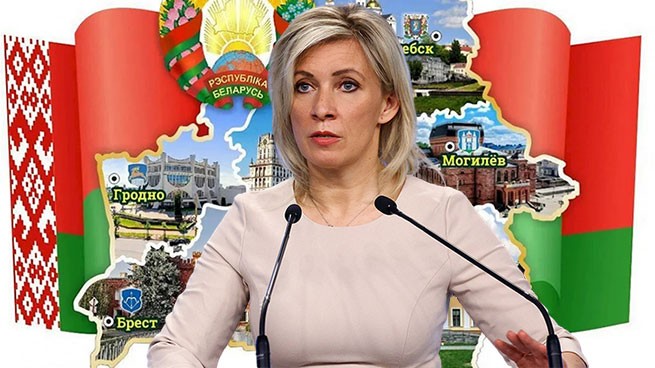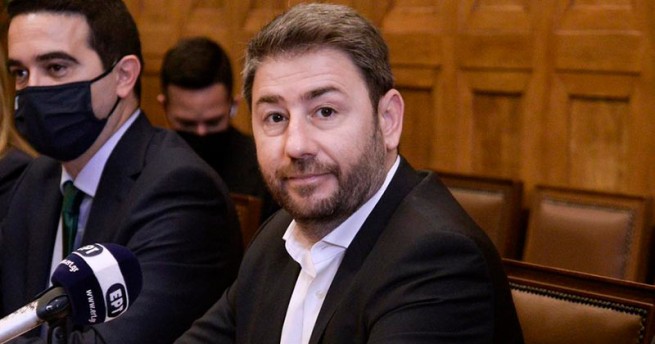Speaking to the nation today, Prime Minister Kyriakos Mitsotakis shifted political responsibility for the spying scandal to his nephew Grigoris Dimitriadis, the head of the administration, and former head of the Hellenic National Intelligence Service (ΕΥΠ), Panagiotis Kontoleontos. I “didn’t know,” the prime minister said.
Full text of the Prime Minister’s statement
Shadows are not allowed in our democracy. That is why I want to speak openly about recent events.
A few days ago, I was informed that in September 2021, when he was still an MEP, the National Intelligence Service carried out legal connection to the mobile phone of Nikos Androulakis.
This procedure was approved by the supreme prosecutor, as stipulated in the regulation adopted in 2018 by the previous government. It lasted three months and was automatically terminated, as required by law, a few days after Androulakis was elected president of the PASOK-KINAL party.
Although everything was done according to the law, the National Intelligence Service underestimated the political dimension of this action. It was formally enough, but politically unacceptable. This should not have happened and led to cracks in citizens’ trust in the National Security Service.
Despite the fact that a well-known political figure was involved in the process, its conduct was imperfect. That is why the commander of the ΕΥΠ was immediately removed from his post, and the general secretary of the office of the prime minister assumed objective political responsibility. And since the word “responsibility” comes from the adjective “direct”, I repeat directly: what was done, Maybe, corresponded to the letter of the law, but it was wrong. I did not know this and obviously would never have allowed it!
However, this case highlighted the absence of additional “filters” in the work of the special services. After all, surveillance of a politician certainly requires guarantees that go beyond the judgment of even an experienced and competent judicial worker.
However, on the other hand, I also want to be clear: the contribution of the National Intelligence Service is significant. This is clearly reflected in Greece’s willingness to face challenges like those in Evros or the Aegean. In our permanent diplomatic and defensive armament, and in our daily fight against terrorism and crime. Therefore, one slip cannot obscure a project that brings tangible benefits to the country. And you don’t have to be an expert to understand how valuable reliable information is in the complex world we live in.
This agency is charged with providing national security and protecting the homeland from geopolitical movements, as well as asymmetric and hybrid threats. That is why in most European democracies such structures are under the authority of the head of government or state, since the scope of their activities goes beyond the boundaries of one ministry.
However, however valuable the contribution of the National Intelligence Service to strengthening the position of Greece, it becomes clear that it is necessary not only to increase its operational competence, but also to re-evaluate the overall system of control and oversight. The new commander is one of the most experienced Greek diplomats and has all the necessary qualities to carry out this task.
At the same time, the government immediately agreed to the establishment of a commission of inquiry, which would obviously work under conditions dictated by the nature of the subject it would be investigating. After all, such a responsible procedure cannot and should not turn into a spy show for party consumption. Moreover, this should not be a reason to reduce the national contribution of the NSI and undermine aspects of national security. Truth must be brought to concrete dimensions. Only in this way can we eliminate the chronic pathologies of the special services.
Personally, I will be open to any creative idea that incorporates advanced foreign experience and strengthens the accountability mechanisms of an agency so important to the country’s security. Therefore, I will readily discuss proposals that will increase the transparency of the activities of our special services, without, obviously, hindering their mission. Starting, of course, with stronger guarantees regarding legal ties. This must be done and will be done immediately, through the adoption of a legislative act.
So today I’m laying out 4 areas of change that the government will propose:
- Strengthen ΕΥΠ accountability and parliamentary oversight through the Committee on Institutions and Transparency.
- Increasing the role of the National Security Council for more efficient use of intelligence and NSS.
- Establishing a framework of legal ties for politicians.
- Changes to ΕΥΠ to strengthen internal controls, transparency, outreach and staff training.
I will be frank with you. There are many enemies lurking in the country, and they would like to have a weak National Intelligence Agency. And if some dark forces outside of Greece are developing any plan to destabilize the country, they should know that Greece is strong and institutionally armored. We live in a dangerous world. But we are a democratic state. And we have a sacred obligation to balance the security of the country and its citizens with the protection of fundamental principles that protect the privacy and confidentiality of communications.
After all, for three years now we have shown that we learn from our failures in order to become better. Personally, I have never hid in the face of difficulties or responsibilities. In an often lonely but constant struggle with self-criticism and constant improvement efforts.
Losing, perhaps briefly, some battles with chronic pathologies. But winning the war is a big bet. And above all, never losing sight of the goal of building a strong, democratic, European and nationally self-sufficient Greece. I will continue along this path so that together we can build even more durable and time-resistant democratic institutions.
***
In a statement, which in other countries is usually accompanied by the words “I resign and call elections”, Prime Minister Kyriakos Mitsotakis tried to absolve himself of responsibility for spying on journalists and political rivals. We are talking about the duties that he assumed 24 hours after winning the elections on July 8, 2019. It is about taking control and responsibility for the work of the National Intelligence Service.
The phrase “I did not know” not only does not justify him and is not even a mitigating circumstance for him, but is the basis for immediate resignation. because if we accept that “he did not know”, this means that he was exercising his duties as prime minister to the detriment of the state if reject “I didn’t know” (it is impossible that he did not know, especially in the form of functioning of the executive state power that he created), then he did not fully correspond to his position and should also immediately resign.
Instead, the prime minister again preferred to indulge lies and hide behind the signature of the prosecutor, whom he himself appointed, stating that N. Androulakis’s wiretapping as a European deputy was “legal” and that it was “interrupted, as the law says” a few days after how he was elected president of PASOK-KINAL. There are no bigger lies, and it’s amazing how he comes out and says things like this:
The law does not single out citizens, MEPs or party leaders if there are grounds for telephone surveillance. That is: a) – they are suspected of committing serious criminal offenses or are associated with persons who have committed or are suspected of committing such crimes, (b) – for national reasons, i.e. to protect national interests.
MEP and President of PASOK-KINAL Nikos Androulakis
There is no law allowing surveillance of a member of the European Parliament without these grounds, just as there is no law allowing surveillance of party leaders. In other words, the fact that ΕΥΠ stopped surveillance when he became party leader is self-evidently false as a reason for supposedly stopping surveillance.
Did N. Androulakis fulfill the above conditions either as a member of the European Parliament or as the leader of the party to be monitored? And in order not to dwell on the timing of surveillance, that is, the time of the election campaign for the election of the President of KINAL, it is necessary to publish an EIA request document to the Prosecutor of the Appeal V. Vlachow, who signed it, and, of course, invite Vlachow herself to publicly say why she signed under the surveillance of an MEP.
“Shadows are not allowed in a democracy,” Kyriakos Mitsotakis said opening his speech by noting that he had been told a “legal connection” to Nikos Androulakis’ mobile phone a few days ago. “Although they were legal, ΕΥΠ underestimated the political dimension of this action,” he stressed, blaming his own intelligence agency. “This should not have happened,” he said, calling the case “incomplete” and noting that Panagiotis Kontoleon took practical responsibility, while Grigoris Dimitriadis took political responsibility.
“What happened was a mistake. I didn’t know it and would never have let it happen,” the prime minister said, referring to the need for “additional filters” on ΕΥΠ cases.
“The task of the service is to ensure national security and protection against asymmetric threats.” He said that the government gave … direct consent to the creation of a commission of inquiry, “throwing” arrows at the opposition, since the issue should not turn into a “spy thriller”, as he noted, introducing the commander of ΕΥΠ in a nutshell: “Only in this way can cope with creative pathologies.
What do you think was the role of Prime Minister Mitsotakis in wiretapping the mobile phones of politicians and journalists?
- He did not know…
- He gave the order.
- He probably knew.
- He probably didn’t know about everything.
- Don’t know/no answer.







More Stories
Today, the Niarchos (Νέαρχος) will be launched at the Lorient shipyard in France
Greek private and public sector unions announce nationwide strikes
Greece: Threat of Demographic Collapse (Video)